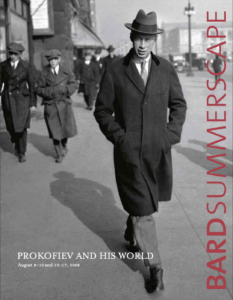Sergey Prokofiev (1891–1953), arguably the most popular composer of the twentieth century, led a life of triumph and tragedy. The story of his prodigious childhood in tsarist Russia, maturation in the West, and rise and fall as a Stalinist-era composer is filled with unresolved questions. Sergey Prokofiev and His World probes beneath the surface of his career and contextualizes his contributions to music on both sides of the nascent Cold War divide.
The book contains previously unknown documents from the Russian State Archive of Literature and Art in Moscow and the Prokofiev Estate in Paris. The literary notebook of the composer’s mother, Mariya Grigoryevna, illuminates her involvement in his education and is translated in full, as are ninety-eight letters between the composer and his business partner, Levon Atovmyan. The collection also includes a translation of Sigizmund Krzhizhanovsky’s unperformed stage adaptation of Eugene Onegin, for which Prokofiev composed incidental music in 1936.
The essays in the book range in focus from musical sketches to Kremlin decrees. The contributors explore Prokofiev’s time in America; evaluate his working methods in the mid-1930s; document the creation of his score for the film Lieutenant Kizhe; tackle how and why Prokofiev rewrote his 1930 Fourth Symphony in 1947; detail his immortalization by Soviet bureaucrats, composers, and scholars; and examine Prokofiev’s interest in Christian Science and the paths it opened for his music.
The contributors are Mark Aranovsky, Kevin Bartig, Elizabeth Bergman, Leon Botstein, Pamela Davidson, Caryl Emerson, Marina Frolova-Walker, Nelly Kravetz, Leonid Maximenkov, Stephen Press, and Peter Schmelz.
Praise
“This is a valuable addition to Princeton’s series on the background and world of prominent composers. And unlike many multiauthored volumes, this one concentrates on useful information rather than opinion—indeed, the first half is all documents. . . . All fascinating stuff.”—Della Couling, Classical Music
“Sergey Prokofiev and His World looks at the composer’s life and music in great detail, shedding new light on the arts in the Soviet Union, in particular, through documents that have become accessible only recently.”—The Weekly Standard
“[An] invaluable volume.”—J. Behrens, Choice
“[This] volume is absolutely indispensable to anyone even casually interested in this field, and all scholars working in Soviet music studies have reason to be grateful to Simon Morrison for his pioneering work.”—Pauline Fairclough, Oxford Journals







